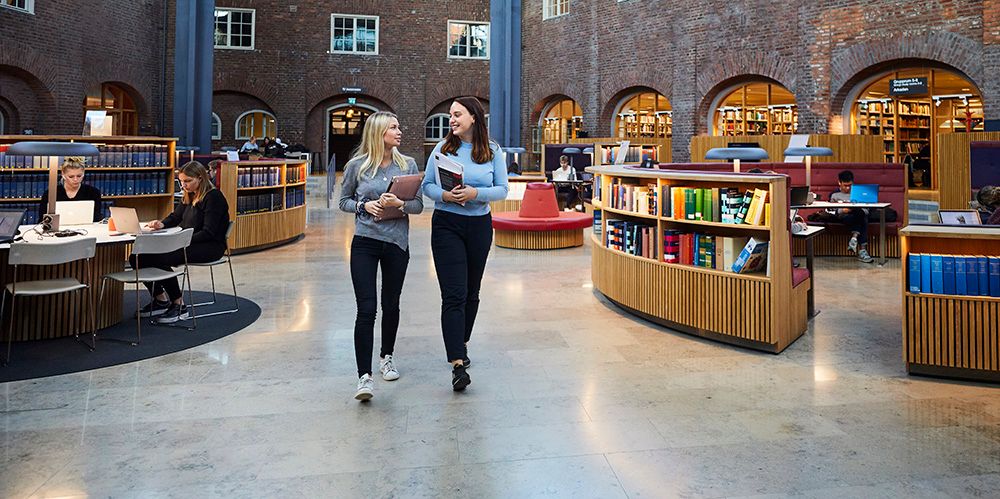KTH Royal Institute of Technology: All your FAQs Answered
Discover admissions, programs, campus life, and more at KTH Royal Institute of Technology. Get answers to all your FAQs and embark on your academic journey with confidence!

Welcome to the bustling crossroads of innovation, culture, and learning that is KTH Royal Institute of Technology. As you stand on the threshold of a new academic adventure in Sweden, questions and curiosities are bound to swirl in your mind. From the practical nuances of student life to the academic rigor that awaits, every international student carries a unique set of inquiries and expectations.
This is precisely why we’ve compiled a comprehensive FAQ guide tailored just for you. Let’s turn those questions into stepping stones towards an unforgettable journey at one of the world’s leading technical universities.
Looking for housing for students in Stockholm? Check out our listings for shared accommodation on Hemavi!
What are the admission requirements at KTH for international students?
Admission requirements at KTH Royal Institute of Technology for international students can vary depending on the level of study (Bachelor’s, Master’s, or PhD) and the specific program you're interested in. However, there are general requirements that typically apply across most programs:
Bachelor's Programs Requirements
- High School Diploma: An equivalent to the Swedish upper secondary school (high school) diploma.
- Proof of English Proficiency: Demonstrated through tests like TOEFL or IELTS. The specific scores required can vary by program.
- Specific Subject Requirements: Depending on the program, you might need to have studied subjects like mathematics, physics, and chemistry at a high level in high school.
Master's Programs Requirements
- Bachelor’s Degree: A completed bachelor's degree equivalent to a Swedish kandidatexamen, usually in a related field of study.
- Proof of English Proficiency: Like the Bachelor’s programs, you'll need to provide scores from an English language proficiency test such as TOEFL or IELTS.
- Relevant Background: Depending on the Master's program, you may need to have a background in specific subjects. This could involve having taken certain courses during your Bachelor’s studies.
- Motivation Letter and CV: Some programs may require a motivation letter and a CV outlining your academic and professional experiences.
PhD Programs Requirements
- Master’s Degree: A completed Master’s degree relevant to the PhD field of study.
- Research Proposal: Many PhD programs at KTH require a research proposal that outlines your proposed area of research.
- Proof of English Proficiency: A demonstration of English language skills, often through standardized testing.
- Interviews: Some departments conduct interviews as part of the admission process for PhD candidates.
For more information about the requirements, application deadlines, and programs offered, visit the official webpage for KTH's Bachelor's Programs, Master's Programs, and PhD Programs.
How do I apply for a student visa or residence permit as an international student in Sweden?
Applying for a student visa or residence permit to study in Sweden involves several key steps and requirements. Here's a general overview of the process for non-EU/EEA international students:
- Acceptance Letter: First, you must be admitted to a full-time study program in Sweden. You'll need the acceptance letter from the university for your visa/residence permit application.
- Application Timing: Apply as soon as you have received your acceptance letter. The process can take time, and early application ensures you receive your permit before your program starts.
- Choose the Right Permit: For courses shorter than three months, you should apply for a short-stay visa. If your course is longer than three months, apply for a residence permit for studies.
- Application Portal: Applications are usually made online through the Swedish Migration Agency's website.
- Required Documents: You'll need to prepare some documents for your application, including a valid passport, the acceptance letter from the Swedish educational institution, proof of comprehensive health insurance (if your program is less than one year), proof of financial means to cover your stay in Sweden (the Swedish Migration Agency specifies the minimum amount required per month for living expenses), and the application fee payment confirmation.
- Proof of Financial Means: You need to demonstrate that you have enough money to support yourself for the duration of your study. The exact amount may vary each year, so check the current requirement on the Swedish Migration Agency’s website.
- Health Insurance: For programs less than one year, you must show you have health insurance that covers you in Sweden. For longer programs, you will be covered by the Swedish health insurance system once you arrive.
This process can vary slightly depending on your country of origin and the specifics of your situation, so it's important to consult the Swedish Migration Agency's website for the most accurate and up-to-date information.
What is the average cost of living for a student in Stockholm?
The total average cost of living for a student in Stockholm is estimated to be between 9000 SEK to 15000 SEK per month, but these numbers may vary depending on individual spending habits and budgetary decisions made by the student.
The largest expense for students is typically accommodation. Rent for a student dormitory or shared apartment in Stockholm can range from around 3500 SEK to 8000 SEK per month, depending on the location and amenities.
Are there any scholarships or financial aid available for international students at KTH?
Yes, KTH Royal Institute of Technology offers several scholarships and financial aid options for international students, particularly at the Master’s level. These scholarships can significantly reduce the financial burden of studying abroad. Here are some of the main scholarships and financial aid programs available at KTH:
- The KTH Scholarship covers the full tuition fee of a one or two-year master’s program. It is awarded based on academic excellence to students who have applied to a Master’s program at KTH as their first priority.
- KTH Joint Programme Scholarship: Specifically for students admitted to certain joint master’s programs involving KTH, this scholarship covers the tuition fee for the duration of the program. The scholarship is merit-based and aims at supporting students of excellent academic background.
- The KTH India Scholarship is exclusive to Indian students who have applied for a Master’s program at KTH as their first priority. It covers the full tuition fee of the program and includes a monthly allowance for the duration of the studies.
- KTH One-Year Scholarship: Awarded to current KTH master’s program students who have achieved outstanding academic results during their first year of studies. This scholarship covers the tuition fee for the second year of the program.
- The Swedish Institute offers scholarships for international students from certain countries coming to Sweden to study. These scholarships can cover tuition fees, living expenses, and some travel grants. While these are not specific to KTH, many KTH students are eligible and successfully secure these scholarships.
- Erasmus Mundus Scholarships: For students from non-EU/EEA countries participating in an Erasmus Mundus Joint Master Degree (EMJMD) program, which can include KTH as one of the partner institutions.
What are the opportunities for student involvement and activities at KTH?
KTH Royal Institute of Technology offers a vibrant campus life with numerous opportunities for student involvement and activities. Engaging in these activities can greatly enrich the student experience, providing chances for networking, personal development, and fun outside the academic realm. Here's an overview of some of the key opportunities for student involvement at KTH:
- THS (Tekniska Högskolans Studentkår): The main student union at KTH, THS, plays a pivotal role in representing students' interests and organizing a wide range of events and activities. Membership provides access to clubs, associations, and numerous services aimed at improving student life.
- Academic and Professional Associations: There are numerous academic associations linked to specific fields of study that organize lectures, workshops, and company visits.
- Cultural and International Clubs: These clubs offer a platform for cultural exchange and activities, helping international students integrate and find a community.
- Sports and Recreation: KTH offers a variety of sports clubs and teams, from football and basketball to frisbee and climbing. The KTH Sports Council oversees many of these groups, promoting physical activity and wellness.
- KTH Innovation: A hub for student entrepreneurs, offering workshops, mentorship, and support for turning ideas into startups.
- Hackathons and Competitions: Students can participate in or organize hackathons and innovation competitions, often sponsored by industry partners.
What housing options are available for international students enrolled at KTH?
KTH Accommodation is a service that helps international students find housing for their first year of studies. This service is primarily available to fee-paying Master’s students and exchange students. Options through KTH Accommodation include:
- Single-occupancy rooms: Typically in student dormitories with shared facilities like kitchens and common areas.
- Studio apartments: Small apartments for one person with private kitchen and bathroom.
- Family apartments: Limited availability for students coming with partners or families.
These accommodations are spread throughout the city, providing a range of living experiences.
Private Rental Market
Due to the limited availability of student housing, many international students turn to the private market. This includes renting a room or an apartment. Websites and forums are useful for finding private rental listings. However, it's important to be cautious of scams. Check out Hemavi for shared accommodation listings across Stockholm.




Comments ()